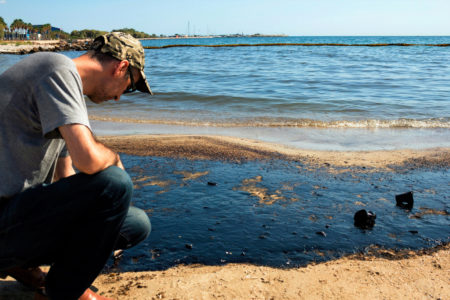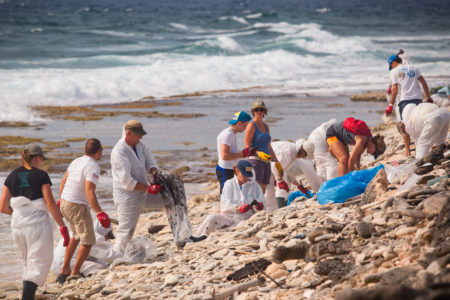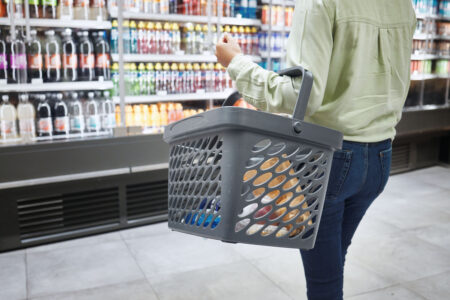Share On Social!
Latinos across the US are reminding leaders and businesses of one simple fact: There is only one Earth and everyone must play a part in protecting it.
It’s why advocates are doing all they can to make a difference in the lives of those impacted by the severe impacts of climate change — including urging for greater protection of the world’s oceans. Without immediate action, the effects of global warming will continue to wreak havoc across the globe, especially for commentates of color and other disadvantaged groups.
It’s facts like these that are causing Latinos to develop a strong voice for environmentalism, according to a recent report from the Hispanic Access Foundation.
“We know that the U.S. Latino connection to the ocean and coast is strong, historical and intimate. From indigenous settlement to the present day, the ocean has given and taken away, alternately providing food and flood, salary and storm,” advocates state. “While vulnerable to nature and vulnerable to the man-made issues carried in its currents and waves, we know that Latinos value our ocean and coasts, and the resources they foster; and we know that Latinos are becoming increasingly concerned with the environment.”
Latinos Battle for Ocean, Environmental Action
As businesses continue to promote harmful usage of pollutants, such as fossil fuels and toxic waste, oceans are changing as a result.
This phenomenon is hitting some Latinos hard, due to their deep links to these waters, according to Brenda Gallegos, a Conservation Program Associate at the Hispanic Access Foundation.
“Growing up Latina, in a borderland city 12 hours away from the water, the ocean became my annual sanctuary,” she writes in a Corpus Christi Caller Times op-ed. “Every year, my family took a vacation to the Texas Gulf Coast blasting Selena albums on our way to Corpus Christi or South Padre Island. I remember making sandcastles, searching for seashells, reading a book, and just enjoying the view of the water.”
Numerous Latino-focused environmental groups—including Azul, Latinx Surf Club Courage Camps, Latino Conservation Week, and River Network—have been working with grassroots advocates, city governments, and national legislators to make moves toward a cleaner environment.
These organizations also note that the need for thorough communications strategies to garner a diversity of supporters. 
It is clear that if we do not take immediate action, things will continue to get worse for everyone, according to the Wilderness Society — who note that protecting at least 30% of the world’s oceans and lands is critical.
“In the contiguous U.S., more than three-quarters of communities of color live in areas with a higher proportion of natural area lost to human activities than the median level in their respective states,” they say in a recent statement. “Communities of color are three times more likely than white communities to live in these ‘nature-deprived’ places, resulting from policies and planning that deny decision-making power to Black people, Indigenous people, and people of color.
Communities of color are also disproportionately exposed to the worst impacts of climate change and pollution.”
Growing Concerns Around Damage to Oceans
Across the board, scientists and advocates have been sounding the climate change alarm for nearly 30 years.
Despite hard evidence of the harm humans were causing on the planet, many—including some significant American leaders—have been slow to accept reality.
As the consequences begin to set in, including recurring extreme weather events, such as the winter snowstorm that rocked Texas in February 2021, some progress is finally being made.
This includes President Biden’s recent collection of executive orders that aim to take significant steps toward ocean protection.
“Practically speaking, the ocean keeps us safe, fed, clothed, and employed,” the Hispanic Access Foundation states. “Its coral reefs protect us from storms, as do the adjacent wetlands that filter our waters. There isn’t a facet of our life that isn’t touched by the ocean.
“Yet, we continue to threaten this balance; and, perhaps unsurprisingly, the ocean responds, and it continues to threaten us.”
When it comes to moving forward, the National Resource Defense Council has two major recommendations: 
- The adoption of new global biodiversity targets at the October meeting of the Parties to the Convention on Biological Diversity (CB) in Kunming, China, and
- The scheduled final session of negotiations at the United Nations to develop an international treaty to strengthen our ability to protect biodiversity in the ocean beyond national jurisdiction.
The Hispanic Access Foundation also published nine recommendations under three areas of action—understanding, engagement, and advocacy—in their report.
How can these measures make an impact?
Kelsey Lamp, with Environment America’s national campaigns to protect our oceans, notes that, “Marine protected areas, when well-sited, well-managed and durable, provide ocean ecosystems with the capacity to restore damaged marine populations, protect endangered species and recover faster from climate-caused disasters.”
That fact—that with human intervention, nature can begin repairing itself—shows just how important it is to take quick, dedicated action.
What You Can Do
As an individual, it is important that you use your voice to speak up for the issues that impact us the most — including water conservation.
“The ocean sustains us – individuals, communities, the global society – physically, mentally, spiritually,” Hispanic Access Foundation advocates state. “It regulates our weather and climate, provides for every other breath we take, nourishes us and inspires us. Across seas, people, ideas and goods have traveled, connecting us with each other, with culture and with land.”
“We find solace on its shores, seek pleasures on its waves, and will cure each other employing secrets from the deep.”
Explore More:
WaterBy The Numbers
74
percent
of Latino kids have had a sugary drink by age 2 (vs. 45% of white kids)



